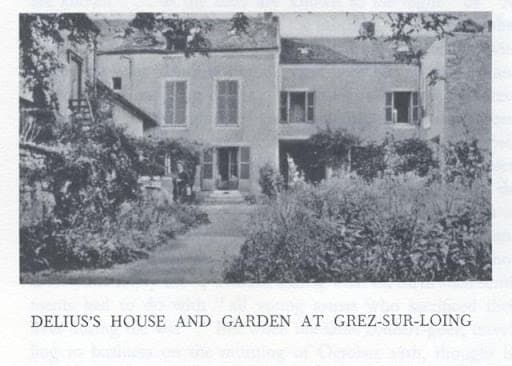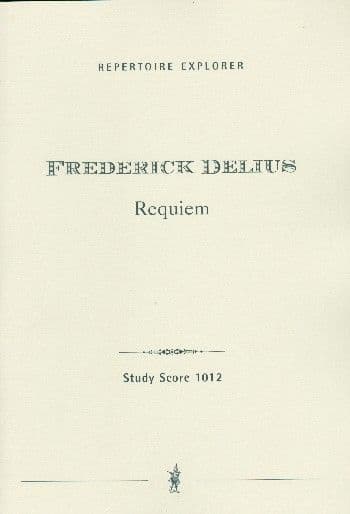On 23 March 1922, Albert Coates conducted the premiere performance of Frederick Delius’ Requiem in Queen’s Hall, London. The origin of the work, subsequently dedicated “to the memory of all young artists fallen in the war,” emerged during a holiday in Norway in 1913. Arguably, it is Delius’ least-known major work, and it was not recorded until 1968. Furthermore, it only seems to have received seven performances worldwide by 1980.
Frederick Delius: Requiem, “Our days here are as one day” (Peter Coleman-Wright, baritone; Waynflete Singers; Bournemouth Symphony Chorus; Bournemouth Symphony Orchestra; Richard Hickox, cond.)
Origins

Frederick Delius
The reason why Frederick Delius, an avowed atheist, began work on a Requiem is still shrouded in mystery. However, by the time of completion in 1916, it became apparent that Delius had been greatly affected by World War 1. In 1914, Delius came to London to attend a Royal Philharmonic Concert of the First Cuckoo and Summer Night on the River conducted by Willem Mengelberg. Delius returned to Grez-sur-Loing during the summer, and World War I was declared on 4 August.
As the Germans advanced at the end of August, most French people were convinced that there was no hope. Grez was on one of the evacuation routes for the wounded, and with headquarters of the British Army nearby at Fontainebleau, the Deliuses decided that it was time to leave. Additionally, a rumour started that Delius and his wife were German spies.
Frederick Delius: Requiem, “Hallelujah” (Peter Coleman-Wright, baritone; Waynflete Singers; Bournemouth Symphony Chorus; Bournemouth Symphony Orchestra; Richard Hickox, cond.)
Back in England

Frederick Delius house at Grez-sur-Loing
The Germans regarded the English declaration of war on them as the worst kind of treachery, and it inspired an intense national hatred of everything and everybody English. These sentiments greatly affected Delius. He spoke fluent German and was married to a Prussian wife, and Richter had referred to him at Bayreuth as “our Delius.”
However, German orchestras no longer played any of his music, and all royalty payments ceased. Delius had also invested a large portion of his wealth in Germany, and he incurred great financial losses. Delius decided to return to England, and in a highly nervous state, eventually settled down to work on his Requiem.
Frederick Delius: Requiem, “My beloved whom I cherish was like a flower” (Peter Coleman-Wright, baritone; Waynflete Singers; Bournemouth Symphony Chorus; Bournemouth Symphony Orchestra; Richard Hickox, cond.)
The Requiem

Frederick Delius: Requiem
The large-scale work calls for extra woodwinds, six horns and extended percussion, full orchestra, double chorus, and soprano and baritone soloists. Delius had paraphrased texts from Shakespeare, Nietzsche, and also the Bible, and recent research has shown that his German Jewish friend Heinrich Simon contributed substantially in putting it together. A biographer writes, “These text sources offer contradictory sentiments, which puzzling as they appear today, over half a century ago must have been entirely incomprehensible.”
The Requiem essentially glorifies life, and supports Delius’ belief in a superior Being, but one that is not specifically assigned to a particular religion. Delius himself described the work, “It is not a religious work. Its underlying belief is that of a pantheism that insists on the reality of life. It preaches that human life is like a day in the existence of the world, subject to the great laws of All-Being.”
Frederick Delius: Requiem, “I honour the man who can love life” (Peter Coleman-Wright, baritone; Waynflete Singers; Bournemouth Symphony Chorus; Bournemouth Symphony Orchestra; Richard Hickox, cond.)
“I have never done better”

Portrait of Frederick Delius
And Delius continued, “The proud spirit casts off the yoke of superstition, for it knows that death puts an end to all life, and therefore fulfillment can be sought and found only in life itself. No judgment as to do and not doing good and evil can be found in any ordinance from without, but only in the conscience of the man himself.”
The work lasts for roughly 30 minutes and is scored in two parts and five sections. Every section features the chorus, along with either the soprano or baritone soloist. First performed on 23 March 1922, even Delius’ greatest supporters were unimpressed. It was described as “the most depressing choral work,” and the text was called “a bit embarrassing, seemingly to be a rather poor, second-hand imitation of Nietzsche.” In direct contradiction to his critics, Delius strongly believed, however, that “I have never done better.”
For more of the best in classical music, sign up for our E-Newsletter
Frederick Delius: Requiem, “The snow lingers yet on the mountains” (Peter Coleman-Wright, baritone; Waynflete Singers; Bournemouth Symphony Chorus; Bournemouth Symphony Orchestra; Richard Hickox, cond.)
